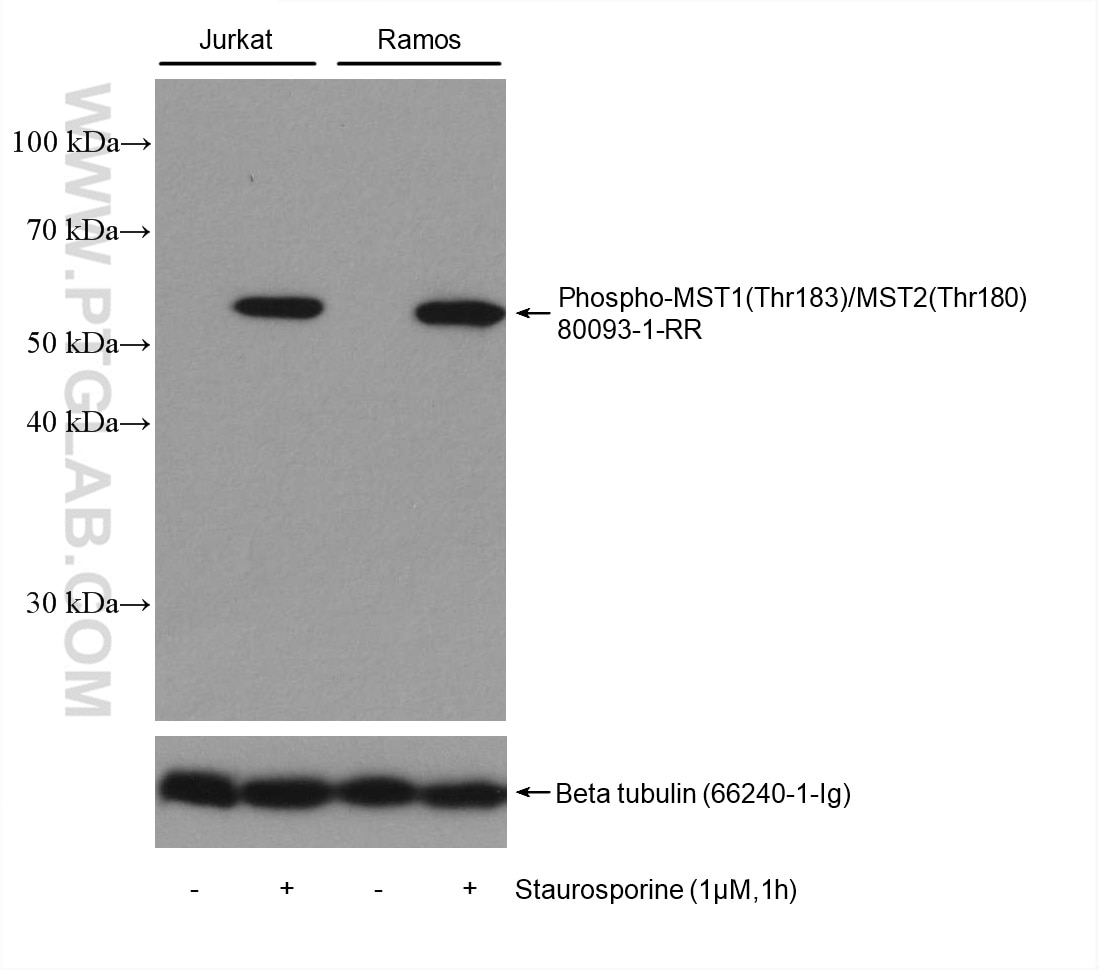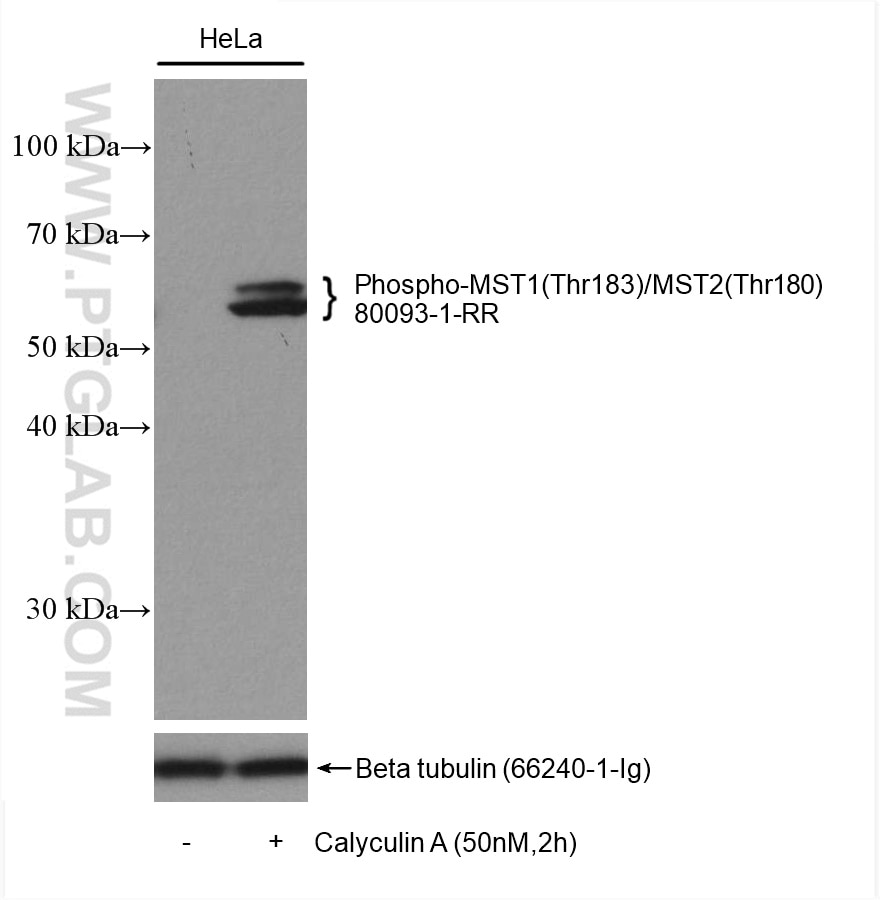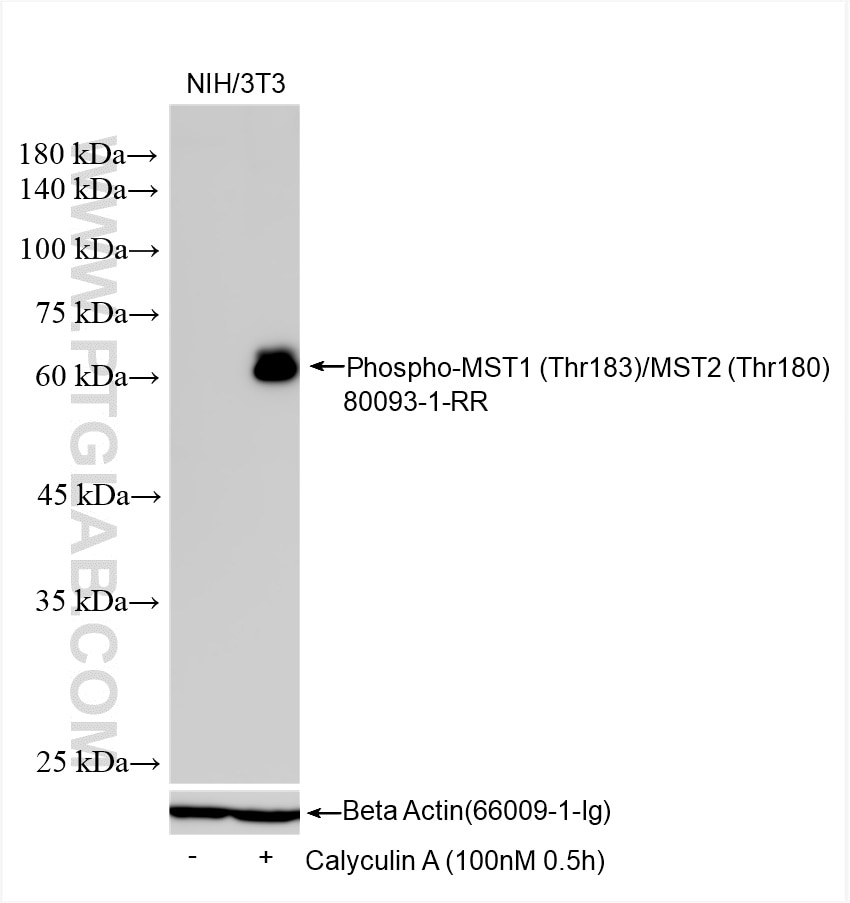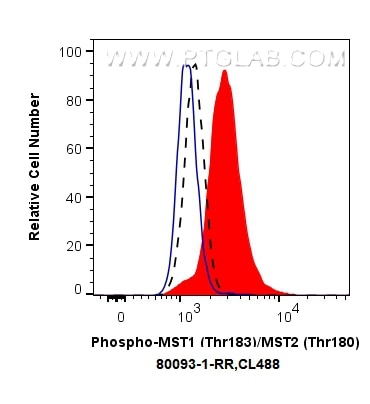Tested Applications
| Positive WB detected in | Jurkat cells, HeLa cells, Calyculin A treated NIH/3T3 cells, Calyculin A treated HeLa cells, Staurosporine treated Ramos cells, Staurosporine treated Jurkat cells |
| Positive FC (Intra) detected in | Calyculin A treated HeLa cells |
Recommended dilution
| Application | Dilution |
|---|---|
| Western Blot (WB) | WB : 1:2000-1:10000 |
| Flow Cytometry (FC) (INTRA) | FC (INTRA) : 0.25 ug per 10^6 cells in a 100 µl suspension |
| It is recommended that this reagent should be titrated in each testing system to obtain optimal results. | |
| Sample-dependent, Check data in validation data gallery. | |
Published Applications
| WB | See 9 publications below |
Product Information
80093-1-RR targets Phospho-MST1 (Thr183)/MST2 (Thr180) in WB, FC (Intra), ELISA applications and shows reactivity with human, mouse samples.
| Tested Reactivity | human, mouse |
| Cited Reactivity | human, mouse, rat |
| Host / Isotype | Rabbit / IgG |
| Class | Recombinant |
| Type | Antibody |
| Immunogen |
Peptide Predict reactive species |
| Full Name | serine/threonine kinase 4 |
| Calculated Molecular Weight | 56 kDa |
| Observed Molecular Weight | 59 kDa |
| GenBank Accession Number | BC005231 |
| Gene Symbol | MST1 |
| Gene ID (NCBI) | 6789 |
| RRID | AB_2918864 |
| Conjugate | Unconjugated |
| Form | Liquid |
| Purification Method | Protein A purification |
| UNIPROT ID | Q13043 |
| Storage Buffer | PBS with 0.02% sodium azide and 50% glycerol, pH 7.3. |
| Storage Conditions | Store at -20°C. Stable for one year after shipment. Aliquoting is unnecessary for -20oC storage. 20ul sizes contain 0.1% BSA. |
Background Information
Mammalian STE20-like serine-threonine kinase MST1, encoded by the STK4 gene, is a multifunctional protein. MST1 and its closest paralogs MST2 (encoded by the STK3 gene), MST3, and MST4 are members of the Class II Germinal Center Family of Protein Kinases . STK3/4 and LATS1/2 (large tumor suppressor 1 and 2) are core kinase components of the Hippo tumor suppressor pathway in mammalians . In the conventional Hippo pathway, the STK3/4 and LATS1/2 signaling cascade phosphorylates and inactivates the transcriptional coactivator YAP1 (yes associated protein 1) and its close paralog WWTR1]. YAP1 and WWTR1 do not have DNA binding domains and they exert their biological outputs, such as cell proliferation and survival, by interacting with the TEAD1-4 transcription factors. Lines of evidence have indicated that dysregulation or loss of STK4/Hippo signaling is linked to developmental disorders and carcinogenesis with poor prognosis. STK4 is a stress-induced kinase and it can be activated in response to cell-death inducers. Autophosphorylation of STK4 at Thr183 (Thr180 in STK3) in the activation loop is a key activation mechanism for STK4/3 because phosphorylation of Thr183/180 causes the cleavage of STK4 by caspases under apoptotic conditions. The caspase-cleavage results in a more active STK4 protein (STK4-N, an amino-terminally truncated STK4), which localizes into the nucleus and induces apoptosis through histone modifications and chromatin condensations.
Protocols
| Product Specific Protocols | |
|---|---|
| WB protocol for Phospho-MST1 (Thr183)/MST2 (Thr180) antibody 80093-1-RR | Download protocol |
| Standard Protocols | |
|---|---|
| Click here to view our Standard Protocols |
Publications
| Species | Application | Title |
|---|---|---|
Ecotoxicol Environ Saf Role of the hippo signaling pathway in the extracellular matrix degradation of chondrocytes induced by fluoride exposure | ||
Exp Eye Res Targeting mechanics-induced trabecular meshwork dysfunction through YAP-TGFβ Ameliorates high myopia-induced ocular hypertension | ||
J Hazard Mater Prenatal and postnatal exposure to polystyrene microplastics induces testis developmental disorder and affects male fertility in mice | ||
Cells Activation of Yes-Associated Protein Is Indispensable for Transformation of Kidney Fibroblasts into Myofibroblasts during Repeated Administration of Cisplatin | ||
Biochim Biophys Acta Mol Basis Dis Hippo pathway activated by circulating reactive oxygen species mediates cardiac diastolic dysfunction after acute kidney injury | ||
Drug Des Devel Ther Leonurine Attenuates CCl4-Induced Hepatic Fibrosis in Mice via the Hippo-YAP Pathway |










